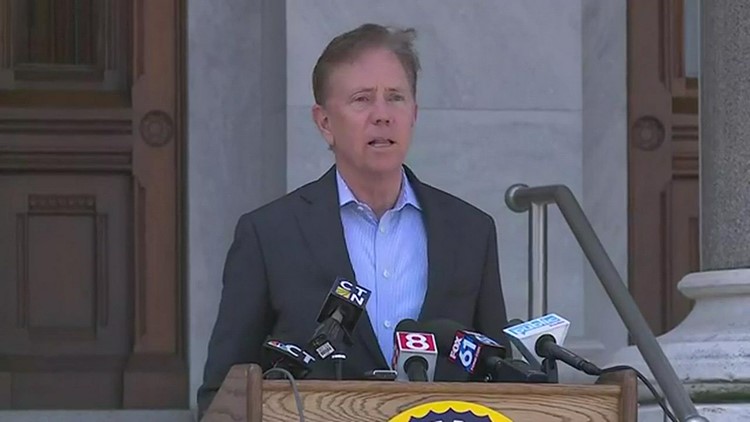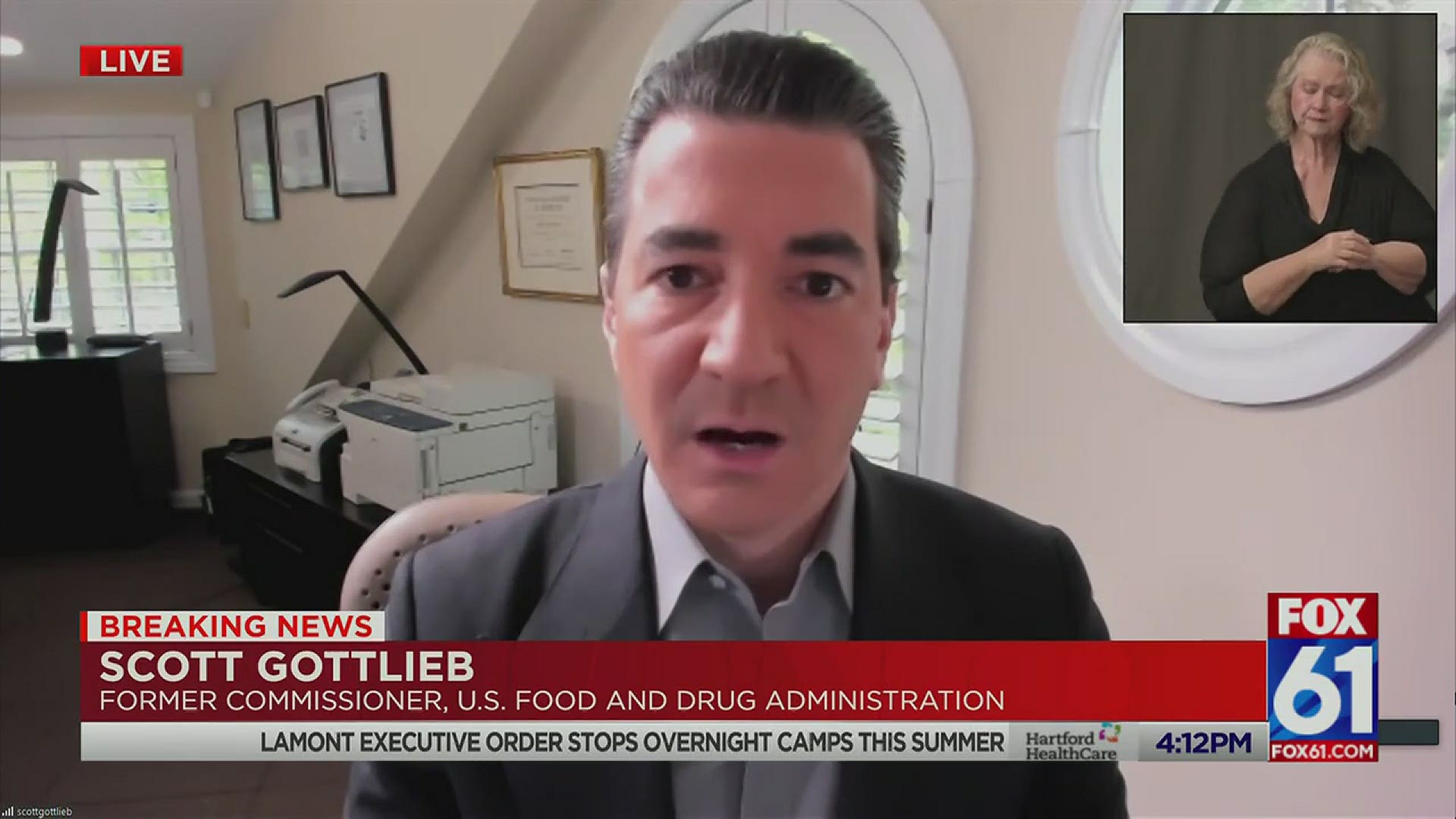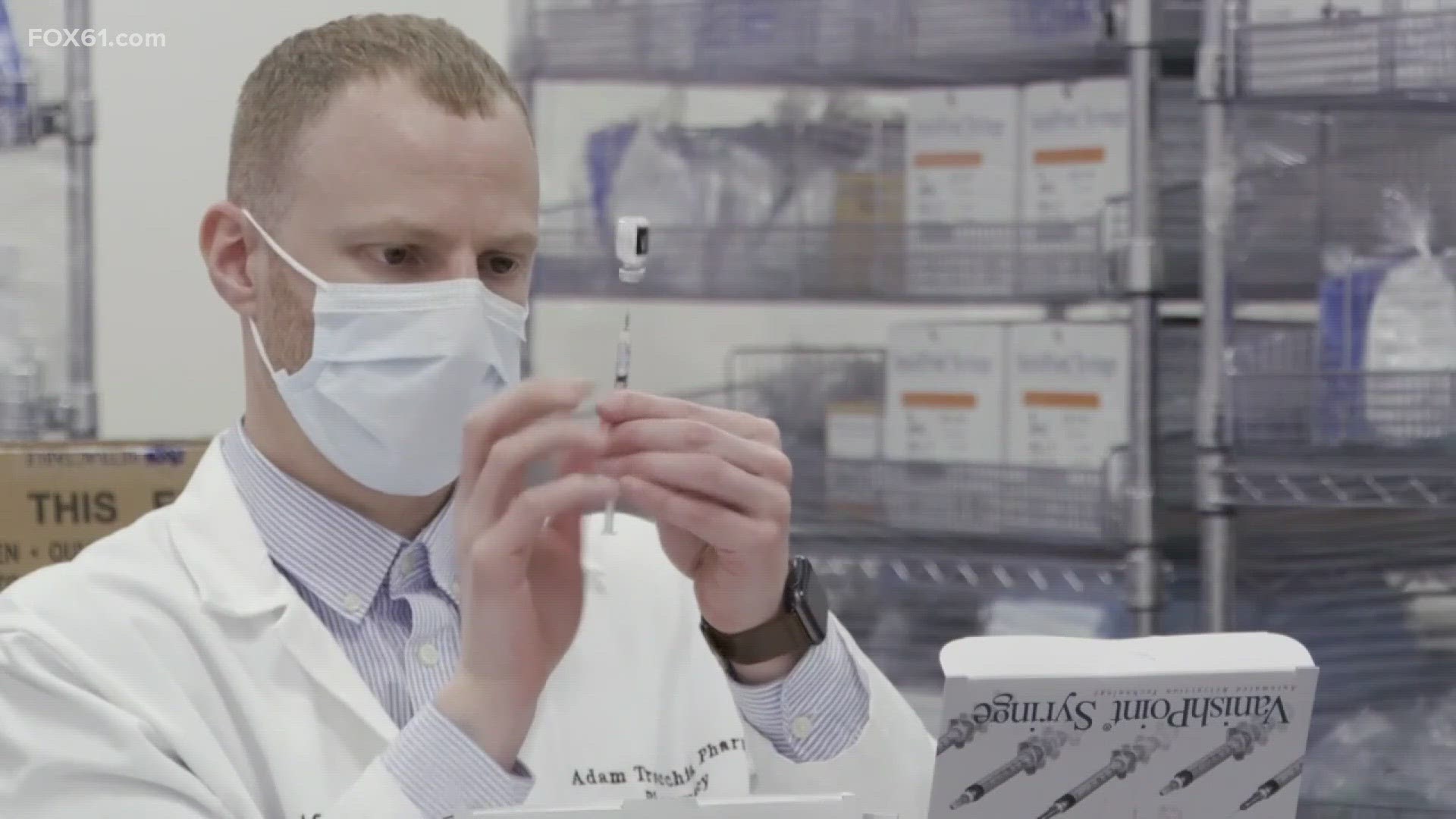HARTFORD, Conn — Connecticut is set to cautiously reopen under 'phase one' on Wednesday, May 20th, and Governor Ned Lamont said "the timing is right," during a Tuesday press briefing. Governor Lamont said the state has hit the "key metrics," with hospitalizations declining and testing for COVID-19 increasing.
According to the latest numbers, more than 185,000 COVID-19 tests have been performed, an increase of 7,841 since Monday. The number of hospitalizations declined by 6, for a total of 914. In all, 38,430 COVID-19 cases have been confirmed in Connecticut. COVID-19 related deaths also continued to increase with 23 new fatalities reported for a total of 3,472.
With businesses eagerly awaiting to return to work, there have been questions about how the state's safety guidelines would be enforced in communities. FOX 61's Zinnia Maldonado asked Governor Lamont about businesses that don't comply with the reopening regulations. She asked, "Will local health directors be in any way legally required to do these check-ups on businesses, or is it on a 'wait for complaint' basis?"
Governor Lamont replied, "If I were the mayor of a town and I had my local health department, and there was some evidence that a store or restaurant weren't taking our protocols very seriously you bet - I'd get the health department out there. I'd say 'this is in the interest of the broader community not just the people in this building, so I want you to take this seriously.' Otherwise, we'll bring in other authorities."
While Governor Lamont will allow certain industries to reopen in this spring, two advisors on the Reopen Connecticut Advisory Group looked to the summer and fall months.
Scott Gottlieb, the former commissioner of the U.S. Food and Drug Administration under the Trump administration, said activities should continue to move outdoors over the summer months, and he hopes there will be a seasonal affect with the virus.
"We don’t know how profound it's going to be. Respiratory illnesses and coronaviruses generally don’t propagate as efficiently in the summer," Gottlieb said. "Now, since we don't have any real cross-immunity to this virus… we're still going to be susceptible into the summer, whereas normally we wouldn't be as susceptible to a coronavirus.
Gottlieb added he expected there to be a "renewed risk," come fall, but added there would be "more tools in the tool box."
"By then, we're going to have a lot more in place in terms of therapeutics, we're going to have broad testing in place…we're going to be more prepared, so I'm optimistic for the future," Gottlieb said.
Gottlieb applauded the efforts made in Connecticut to "flatten the curve," since the pandemic started.
"In this state, we had a very thoughtful approach in terms of what we did do when it came to population based mitigation. There were certain activities that continued in this state and I think it was very thoughtful and prudent… allowing certain activities that were low risk, things done outside for example, during the mitigation phase."
Going forward, Gottlieb believes the focus will turn targeting the virus itself and supporting people who are infected by identifying them and getting them tested.
Ezekial Emanuel, a vice provost at the University of Pennsylvania and worked under the Obama Administration, echoed some of Gottlieb's points Tuesday.
"In thinking about how to reopen and how to phase the reopening, I've been impressed by the thinking of both looking at the public health measures on one axis and looking at the economic impact on another axis. Both factors need to be taken into account, and you need to get to that sweet spot," Emanuel said.
He also agreed with Gottlieb on the summer months ahead saying, "we are probably going to be lucky…maybe the transmission rate and infectivity rate is down. We won't know. We'll find out. It is the case that the weather is warmer, people can do more activities outside, and we should take advantage of that because the documented number of transmission cases outdoors is extremely low. That does mean in the fall, come October, the whole situation is going to reverse and we can't let our guard down."
Both Gottlieb and Emanuel also spoke about the future of a COVID-19 vaccine during Tuesday's briefing.
Emanuel said there are multiple ways to produce a vaccine, but large trials will need to be done and side effects will need to be carefully considered.
"Remember, we're going to be injecting this vaccine into otherwise healthy people and any number of side effects are a problem when you're taking healthy people and potentially making them sick," Emanuel said.
He said he was skeptical that we would have a vaccine by the end of the year.
"I think the 12-18 month timeline would be warp speed, and that is a much more likely and even that has big challenges behind it," Emanuel said.
Gottlieb believed by the fall there would be more therapeutics available. He said there were four companies, including one in Connecticut, developing antibody-based drugs. When it comes to a vaccine, Gottlieb believed large scale trials could be a reality.
"I think a base-cased assumption should be that we will have by the fall several manufacturers of vaccines that will have millions of doses - maybe low tens of millions - but we should think of millions of doses available in the fall for large scale clinical trials…we might be able to deploy a vaccine in the fall both experimentally in large scale clinical trials if we have outbreaks in cities or states. And potentially therapeutically, to try to ring-fence those infections, those outbreaks," Gottlieb said. "I think it's unlikely but not impossible that we would have vaccine in sufficient quantities to actually make it available on a more widescale basis. And even if we were in a position to do that - if we had the quantities to do that, which is possible, I think the idea that we would have an approved vaccine before the end of the year is less likely… We'd probably be making it available under what we call an emergency use authorization by the FDA for select populations that are at particularly high risk of a bad outcome for whom an experimental vaccine the risk benefit of that might make sense"
He said an eventual vaccine could work like a flu vaccine, which reduces disease severity but doesn’t prevent people from getting the infection.
"It may be like a flu shot where we have to get it on a seasonal basis," Gottlieb said.




